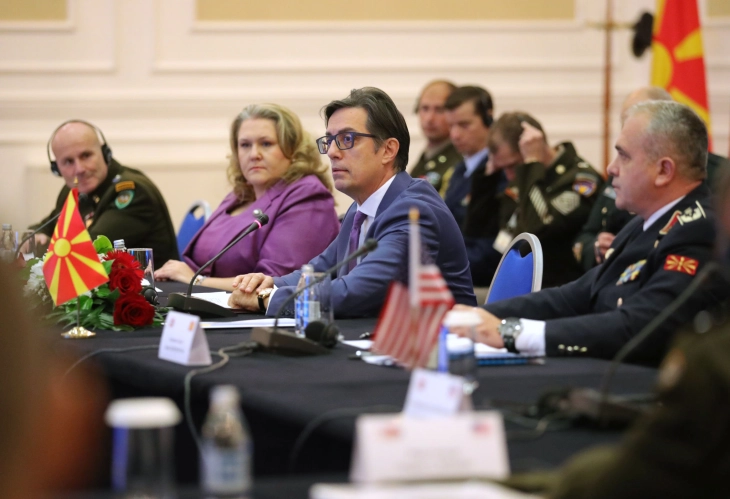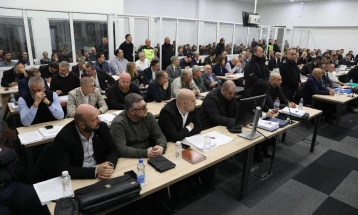Pendarovski: Russian invasion of Ukraine, as never before, imposes a need for EU to focus on Western Balkans European integration
- Во изминатите две децении иницијатива САД-Јадранската повелба (А-5) се покажа како успешен регионален механизам за јакнење на довербата помеѓу земјите членки, но и пошироко, оцени министерката за одбрана Славјанка Петровска на денешната 26. Конференција на началниците на Генералштабови (НГШ) на армиите од земјите членки на САД-Јадранската повелба (А-5).

Skopje, 27 September 2023 (MIA) – Over the past two decades, the US-Adriatic Charter (A-5) initiative has proven to be a successful regional mechanism for strengthening trust between the member states and wider, Defence Minister Slavjanka Petrovska said Wednesday at the 26th US – Adriatic (A-5) Chiefs of Defence conference which takes place in Skopje.
According to Petrovska, the results of the action and cooperation of this initiative are clearly visible and widely recognized.
"Four of A-5 member countries are full-fledged NATO members, however we jointly contribute to the support of international peace and international operations, our joint contribution to the ISAF mission and Resolute Support Mission in Afghanistan were widely recognized and valued by our allies. The variety of ideas and projects for cooperation continues in the developing defence capabilities within NATO defence planning process and the fulfilment of the obligations of the capability and partnership goals and then within the framework of joint training and exercise of the forces, crisis management and many other areas,” Petrovska said.

She said that in the past two decades, the United States has been the strongest motivator and supporter of the European and Euro-Atlantic agendas of the Charter member states.
“Without your unselfish support, we would not be where we are today. I am confident that the support will continue with undiminished intensity in the next period and in the implementation of future planned projects within the framework of the US – Adriatic Charter,” Petrovska noted.
“Cooperation with you gives me the right to be sure that you successfully cope with all challenges and that you will do it even more successfully in the future. However, it is time for such determination and wisdom to be recognized by the political leadership in our country and the countries of the region, and to direct the energy towards solving problems, not provoking them or creating new ones,” Petrovska said.
Supreme Allied Commander Europe, General Christopher Cavoli, said that the said that Russia's invasion of Ukraine points to the value and importance of collective security and collective territorial integrity.

“All the countries present here have significant joint cooperation programmes and participate as partners and allies in the modernization of NATO within the framework of the collective defence concept. Russia’s invasion of Ukraine also reminds us that we need to work on stability every day and recent events in the region show that we all must contribute to stability every day,” Cavoli stressed.
President Stevo Pendarovski also addressed the conference who expressed his satisfaction that North Macedonia chairs A-5 this year for the first time since the country joined the NATO.
He pointed out that since its establishment until today, the Adriatic Charter has largely achieved its initial goal - promoting and implementing NATO's open door policy.
“Over the past years, North Macedonia has backed without hesitation the promoting the goals of the Charter and will continue to do so in order to understand and accept the advantages of partnership and integration in the NATO in the best way. In this regard, I want to underscore the importance of the overall US support, which continues even today to the European aspirations of the Western Balkans, and in the function of ensuring peace and prosperity of the entire region,” Pendarovski said.
He noted that Russian invasion of Ukraine, like never before, imposed the need for the EU to focus on the integration of the Western Balkan countries, a process, which he assessed will strengthen the stability, security and democratization of the region.
“Unfortunately, postponing European integration for various reasons in nearly all Western Balkan countries is shaking the Union’s credibility. The slow pace of the EU integration process is one of the threats to democracy in the Balkans. Several public opinion surveys show that support for Western-oriented organizations and countries is declining, and for the first time after three decades, support for some other organizations and different management models is growing,” Pendarovski noted.
Chiefs of General Staff of the armies of Albania, Bosnia and Herzegovina, Croatia and Montenegro, as well as top military officials from NATO's Allied Joint Force Command Naples (JFC Naples) and the United States European Command attended the conference.
Conference attendees also include military representatives from the US-Adriatic Charter observer states Slovenia, Serbia and Kosovo, as well as commanders of US National Guards (NG), partners of A5 Armies: Iowa NG, Maryland NG, Mein NG, Vermont NG, Minnesota NG, Ohio NG, Colorado NG and New Jersey NG as guests.
Photo: MIA







